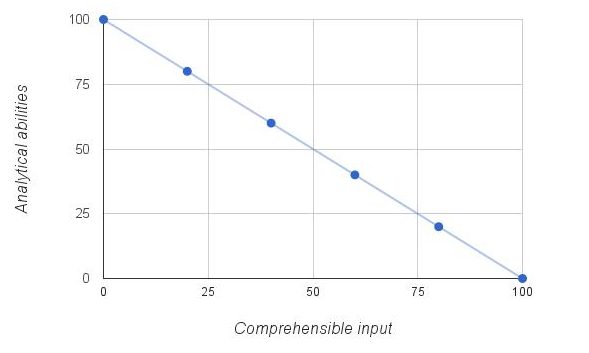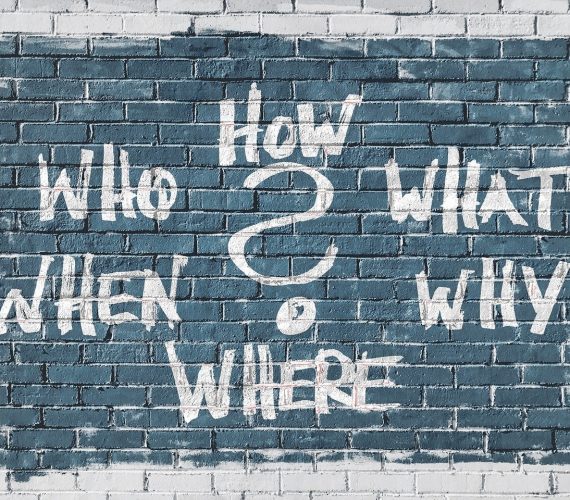
Can you learn a language without studying its grammar?
When something seems too good to be true, it probably is.
So when you hear something along the lines of learning a language “without grammar”, this should raise a red flag.
Since language consists of grammar, trying to learn a language without grammar is like trying to learn math without numbers.
Grammar is the structure of a language, and when you learn a language you have to learn its structure, one way or another. As soon as you have a subject and a verb, you have grammar. You may not want to call those words “subject”, “articles” or “verbs”, but the fact that you don’t give names to those words that does not mean that you don’t have to learn them.
The question is not whether you have to learn grammar, because you are learning it anyway, the question is whether to learn grammar explicitly or implicitly (guessing).
So how can you learn grammar?
You can learn grammar both deductively (focus on form) and inductively (focus on meaning), but not subconsciously. The focus on form vs focus on meaning debate has been going since the times of the Akkadians, who already 2,000 years ago developed CLIL activities to teach the Sumerian language.
Explicit grammar was precisely developed to help people understand language, not to make it more difficult. Explicit instruction may be called grammar, notes, comments, help, clarification, tips, or hacks, but whenever you are clarifying something we are dealing with “grammar”, no matter how much we try to disguise it.
Basically, the less you understand, the more you have to turn to your analytical abilities, which vary from person to person. To illustrate this concept I created the graph below, where you can see how the more you understand (comprehensible input), the less strain on your cognitive skills.

But some people go to the target country and they learn the language “without grammar”.
Of course, and they attain different results. In fact, it’s not that they are learning “without grammar”, it’s that they are learning “grammar” inductively. In other words, they are learning through “guessing”.
But “guessing” does not mean “not learning”. It entails turning to your analytical abilities. This is why results vary, from people who may achieve fluency simply through exposure and interaction, to people who struggle and need explicit instruction. The latter are not “lazy” or “not motivated”, but simply find it difficult, just like some people find math difficult.
Let’s see an example of “learning without grammar” from scratch using the direct method. Imagine you want to learn German and hire a language teacher, who will teach you “without grammar”. Let’s see how it works:
Teacher: Ich heisse Klaus. Wie heisst du?
You: Ich heisse [your name].
Teacher: Ich wohne in Berlin. Wo wohnst du?
You: Ich wohne in [the city where you live].
And so on and so forth.
You see? You learned how to say your name and where you live without explicit grammar. In fact, you didn’t have to know that “Ich” is a subject, and “heisse” a verb. You just knew instinctively. But the fact that you “guessed” it does not mean that you didn’t have to consciously “learn” it. “Guessing” is a deliberate conscious activity, not subconscious, as some scholars claim.
In fact, you were aware of what you were doing, and turned to your analytical abilities to understand the message, even if nobody clarified it for you. But, can we sustain this “learning through guessing” at higher levels or with a large L1-L2 distance? Some programmes and language schools (e.g. Rosetta Stone, Berlitz, Inlingua) are quite good at teaching inductively, although some users may find this method somewhat difficult.
Does skipping “grammar” work with every language?
It depends on each individual, but generally it works best with languages close to your L1. Let’s assume you’re an English speaker who wants to learn Chinese. You hire a teacher, who will teach you Chinese “without grammar”. S/he starts by saying something simple like:
![]()
You would probably find this more difficult than the German example above. Of course, a Chinese teacher could try to explain it to you by pantomiming and using visual materials. But the question is: why did “guessing” work for you with German but not so much with the same sentence in Chinese?
The reason is because you don’t learn through exposure, but when you understand.
Guessing can range between:
(1) “Estudio matemáticas en la escuela”
(2) ![]()
If “guessing” was subconscious, why would you find #1 easier to understand than #2? The reason why you find #2 more difficult is not because you are not “enough motivated” or are not learning it in a “real life situation”. The reason is because of the language barrier.
The bottomline is that, other things being equal, learning with explicit grammar is hard, but learning without it is generally harder, depending on your analytical skills and the L1-L2 distance.
So how do you actually learn a new language?
Through a wise combination of deductive and inductive learning. The more you advance, the more you can relate new knowledge to old knowledge. I think best learning is the one that builds bridges that take you from known structures to new ones in a progressive way, making the most of your cognitive skills to break the language barrier smoothly.
Thanks for reading, and good luck on your language journey!
Related answers:



Bob
interesting point of view ! thanks for sharing this article !